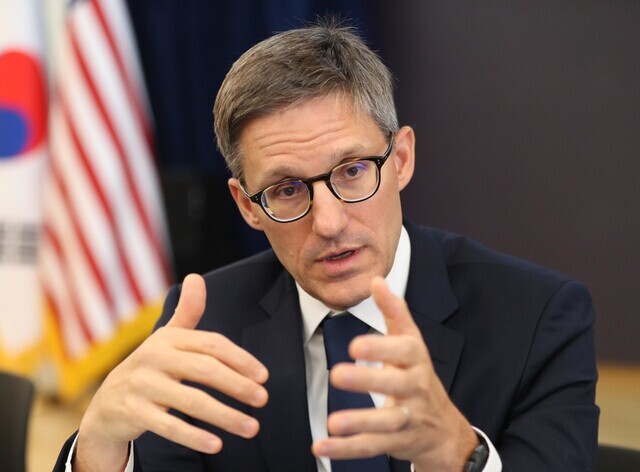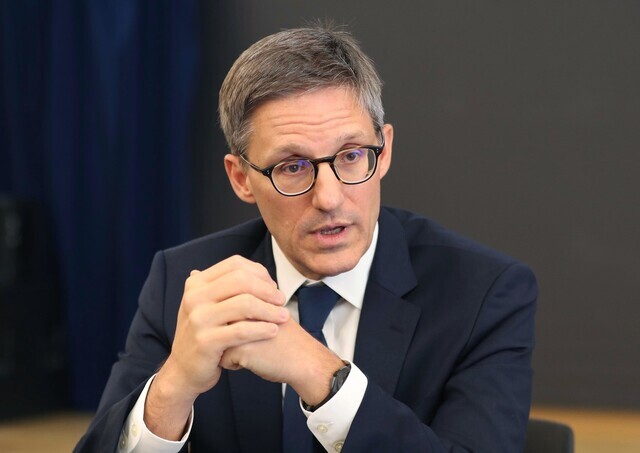hankyoreh
Links to other country sites 다른 나라 사이트 링크
[Interview] US supports S. Korea being “global pivotal state,” says senior US State Dept. advisor

Derek Chollet, the counselor of the US State Department, underlined South Korea’s role as a “global pivotal state” during an exclusive interview with the Hankyoreh on Monday. It was clear from his remarks that the US hopes that cooperation between NATO and Asian countries such as Korea, as well as trilateral cooperation between Korea, the US, and Japan, will play an important role in tackling challenges on the global stage.
Chollet spoke of the potential of US-China cooperation on the issue of North Korea’s nuclear program, noting that China “has to play a role in ensuring the DPRK [North Korea] ceases its provocative acts.”
Chollet, who is a senior policy advisor at the US State Department, met with South Korean government officials while visiting Korea on Monday and Tuesday to discuss issues including the Indo-Pacific Economic Framework, strengthening the South Korea-US alliance, and bilateral cooperation on North Korea, China and Myanmar.
Hankyoreh (Hani): Last month, South Korea was one of four Asian partners to attend a NATO summit for the first time. What sort of specific cooperation do you expect to see between NATO and its Asia-Pacific partners in the future?Derek Chollet: It was extremely important that the ROK [South Korean] president, President Yoon, came to Madrid for that historic meeting between NATO allies. The NATO partnership is just getting started, and I think it’s important that Korea opens an office in Brussels, at NATO, and finds ways that we can meet shared challenges together and create better interoperability among our militaries. We already have European countries participating in military exercises like RIMPAC [Rim of the Pacific]. So I think deepening the connections between our like-minded partners is very, very important, particularly as we are seeing so many challenges become truly global. For example, we’re seeing that the Ukraine crisis is truly a global issue. The principles at stake are principles that all countries should share: principles of state sovereignty, the idea that a larger neighbor cannot invade a smaller neighbor and try to force its will upon that neighbor, and the idea that states should have a right to defend themselves.

Chollet: The United States and our partners are very concerned about the PRC’s [China’s] increasingly reckless and risky behavior in and around Taiwan. US policy towards Taiwan has not changed. The United States does not support Taiwan’s independence, and we believe in adhering to the “One China” policy and our commitments under the Taiwan Relations Act. The United States does not seek a change in the status quo. We see China’s actions as changing that status quo or trying to change it, and that’s what we think is so dangerous. So that’s why it’s incumbent on all of us to continue to work together and send this clear message of our concerns and also set up guardrails in the relationship with the PRC to ensure that we can mitigate those risks as best as possible.
Hani: South Korean security concerns are heightening given the complete lack of cooperation between the US and China even as North Korea continues to advance its nuclear and missile programs. While the US is emphasizing the importance of trilateral military cooperation among the United States, South Korea and Japan, do you think North Korea’s nuclear and missile issues can be resolved only with trilateral military cooperation, without cooperation between the US and China?Chollet: The PRC has to play a role in ensuring the DPRK ceases its provocative acts. I think we have a common interest in not having a nuclear North Korea, and it’s something that the Secretary [Antony Blinken] and Chinese Foreign Minister [Wang Yi] had a conversation about in Bali. We’re very concerned about provocations from the DPRK, and we see that as creating greater risk for conflict, which none of us wants to see.
Hani: The US is emphasizing the importance of trilateral cooperation among the US, South Korea and Japan. What are the objectives of that cooperation, and what kind of role can the US play in helping to resolve the historical disputes between South Korea and Japan?Chollet: Trilateral cooperation can not only address issues here on the Korean Peninsula but also ensure our shared security interests elsewhere in the world. The trilateral mechanism is very important, whether it’s through military exercises or other ways we can cooperate. I should underscore again that the United States is very supportive of the idea of the ROK becoming a more active player on the global stage and the idea of the ROK being a global pivotal state. The United States is very supportive of a stronger relationship between Japan and South Korea, and we respect that there are differences that have to be resolved between the ROK and Japan. As a close friend of both countries, we’ll do what we can to support and facilitate that. And I think the trilateral mechanism is one way we can do that, but we are also seeking other ways.
By Park Min-hee, editorial writer
Please direct questions or comments to [english@hani.co.kr]

Editorial・opinion
![[Column] Season 2 of special prosecutor probe may be coming to Korea soon [Column] Season 2 of special prosecutor probe may be coming to Korea soon](https://flexible.img.hani.co.kr/flexible/normal/500/300/imgdb/original/2024/0426/3317141030699447.jpg) [Column] Season 2 of special prosecutor probe may be coming to Korea soon
[Column] Season 2 of special prosecutor probe may be coming to Korea soon![[Column] Park Geun-hye déjà vu in Yoon Suk-yeol [Column] Park Geun-hye déjà vu in Yoon Suk-yeol](https://flexible.img.hani.co.kr/flexible/normal/500/300/imgdb/original/2024/0424/651713945113788.jpg) [Column] Park Geun-hye déjà vu in Yoon Suk-yeol
[Column] Park Geun-hye déjà vu in Yoon Suk-yeol- [Editorial] New weight of N. Korea’s nuclear threats makes dialogue all the more urgent
- [Guest essay] The real reason Korea’s new right wants to dub Rhee a founding father
- [Column] ‘Choson’: Is it time we start referring to N. Korea in its own terms?
- [Editorial] Japan’s rewriting of history with Korea has gone too far
- [Column] The president’s questionable capacity for dialogue
- [Column] Are chaebol firms just pizza pies for families to divvy up as they please?
- [Column] Has Korea, too, crossed the Rubicon on China?
- [Correspondent’s column] In Japan’s alliance with US, echoes of its past alliances with UK
Most viewed articles
- 1Samsung subcontractor worker commits suicide from work stress
- 2‘We must say no’: Seoul defense chief on Korean, USFK involvement in hypothetical Taiwan crisis
- 3[Editorial] Korea’s surprise Q1 growth requires objective assessment, not blind fanfare
- 4No good, very bad game for Korea puts it out of Olympics for first time since 1988
- 5Division commander ordered troops to enter raging flood waters before Marine died, survivor says
- 6N. Korean delegation’s trip to Iran shows how Pyongyang is leveraging ties with Moscow
- 7Korea’s 1.3% growth in Q1 signals ‘textbook’ return to growth, says government
- 8US overtakes China as Korea’s top export market, prompting trade sanction jitters
- 9[Column] Park Geun-hye déjà vu in Yoon Suk-yeol
- 10[Column] Season 2 of special prosecutor probe may be coming to Korea soon